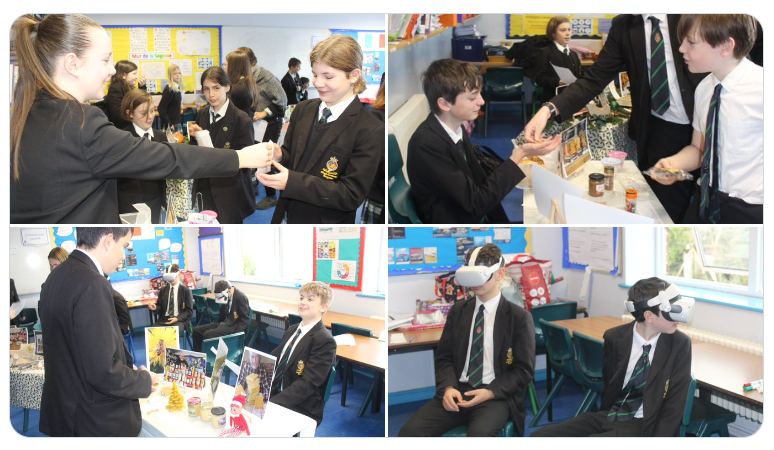From The Language Show 2024 (part 1): Finding a kindred Immersive Mission
- Julia Vogado
- Nov 15, 2024
- 4 min read
This year's 'The Language Show' was as jam-packed as ever with inspiring talks, presentations and workshops for language teachers, learners and professionals. As it is still an online event, with all sessions available on-demand for 6 months afterwards, there is none of the difficult decision-making or FOMO from the in-person events pre-Covid; no more rushing from one side of large venues to the other or jostling for seats, and no more professional development overload, because you can spread the sessions out over the next 26 weeks if you want to! The live timing wasn't the best for me this year, and I've lots to watch, but I've already enjoyed the top two on my list, both which have left me more fired up than ever about getting on with our mission at All Abroad! Bus!
First up, I listened with great interest to a talk by Kara Lewis - Lecturer and Project Manager at University of Wales Trinity Saint David (UWTSD) entitled "Beyond words: Experiential Learning Through Immersive Technologies in Language Acquisition", an initiative to bring Welsh language and culture to life for learners, or, in Kara's words "how to teach one of Europe's oldest languages through the most up-to-date technology!'. At UWTSD, she and her colleagues are very fortunate to have an immersive room in which trainee teachers, students and local schoolchildren alike are able to come and learn Welsh language and about the culture, collectively and kinaesthetically, using innovative experiential teaching methods. From giving directions in Google Streetview to solving clues in escape rooms, adding their own art to real art gallery collections to listening to children 'from' WW2, examples showed participants fully immersed in a wide range of authentic resources and activities, all the while practising the Welsh language in relevant and meaningful ways. The result has been high levels of engagement, motivation and success with learning this very old language.
Hearing Kara talk about research from Bae, Lee and Han (2018) about 'Second Language Anxiety' (SLA) and how the immersive approach addresses these issues, eg. 'Low-risk, error-friendly learning space. Non-judgemental'; 'Gain confidence', and 'Desuggestopedia' (a method that reduces anxiety in language learners by eliminating negative feelings and barriers to learning) really resonated! SLA is very real in traditional languages classrooms, dampening motivation and potentially shortening the language learning journey of far too many students - but it doesn't have to be that way!

(c) Kara Lewis, UWTSD
In addition to its ability to create a safe, comfortable space for experimenting with language - for all students, even the less confident ones, Kara shared some other key characteristics and benefits of working with immersive technologies, derived from her experience and feedback from participants:
children and young people are growing up with immersive technologies like Virtual Reality (VR) and it's really important to use it when you can
it can also raise the kudos of languages as a subject, which is much-needed!
immersion creates flow, and when in the flow state, you become a captive audience and you learn deeply;
authentic immersion is key, using real/realistic scenarios to bridge the classroom and the world outside, which reduces cognitive load and helps students feel less self-conscious,
whilst communication between peers feels more natural, given the reality factor;
you can keep the language focus tight and control comprehensive input of sessions to ensure that any potential distraction factors are minimised!
realia and multi-sensory elements ensure that participants are engaging all their senses, including their haptic sense (sense of touch) which all helps to embed learning
it makes learning more inclusive and accessible too;
the role of teachers begins to change to that of facilitators, as students become "co-pilots" - more autonomous and taking more control of their learning;
engagement and motivation really are key to success with languages, and an immersive approach really does seem to maximise both!
I'm so impressed by all the work Kara and her colleagues have been creating at UWTSD and I look forward to following their journey and further developments in the field of immersive technology as a vehicle and motivator for teaching and learning Welsh, including the interactive VR language-learning games they are working on. I was also just really heartened to find a kindred spirit and mission out there! It can be hard going at times, indeed often, when you are trying to get something new off the ground, but for such an inspiring person and talk to echo our own observations, to validate the rationale behind our own work and to share a similar purpose, I know more than ever just how worthwhile it is! Perhaps I will even one day be able to participate and re-connect with my Welsh roots!
Currently, at All Abroad! Bus we use a combination of multi-sensory and multi-media installations and activities for the group experience, and our original 360° VR headset tours for participants to enjoy their own individual journeys too - and we find this set-up works really well. However, we're excited to be slowly getting acquainted with some of the opportunities available for extending peer and collaborative learning in immersive rooms, infrastructure that is still extremely costly and only available in very few locations, notably places of further education (FE) and higher education (HE), but it is undoubtedly the future and we are starting to reach out to FE & HE institutions about potential collaborations in the near future. Watch this space!
The important thing to remember, and to quote some teacher feedback from UWTSD, as with all new tech, it's not a simple matter of transferring old activities into the shiny new immersive space, but 'thinking carefully about relevance of activities and how to utilise immersion to enhance learning'. At All Abroad! Bus we capture and create films and resources specifically for immersive spaces, from authentic scenarios and interactions, with activities and tasks tailored to the Modern Foreign Languages (MFL) curriculum for school visits - with lots of cross-curricular overlap. To explore our immersive offerings and see how we’re bringing languages and cultures to life, or to discuss potential collaborations, please explore our website or get in touch for more information!
In part 2 from the Language Show 2024, we will be looking at why languages are needed for a changing Britain - the most urgent, but also possibly the most heartwarming talk of all!












Comments